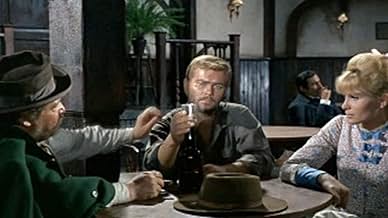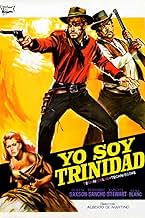IMDb RATING
6.0/10
673
YOUR RATING
Django's father is framed by his business partner Clusker and shot by a bounty Killer. Django inherits his fathers part of the business and a score to settle with Clusker.Django's father is framed by his business partner Clusker and shot by a bounty Killer. Django inherits his fathers part of the business and a score to settle with Clusker.Django's father is framed by his business partner Clusker and shot by a bounty Killer. Django inherits his fathers part of the business and a score to settle with Clusker.
Glenn Saxson
- Glenn Garvin
- (as Glen Saxson)
- …
Ida Galli
- Jessica Kluster
- (as Evelyn Stewart)
Guido Lollobrigida
- Ward
- (as Lee Burton)
Ettore Arena
- Saloon Guest
- (uncredited)
Fortunato Arena
- Cluster Gunman
- (uncredited)
Bruno Ariè
- Cluster Henchman
- (uncredited)
John Bartha
- Thomas Garvin
- (uncredited)
Augusto Brenna
- Bank Customer
- (uncredited)
Amerigo Castrighella
- Saloon dance costumer
- (uncredited)
Featured reviews
As most genre fans expect, there's no overlap between this incarnation of a Django and Franco Nero's original. Glenn Saxon straddles the fence between laconic and dull in the wronged hero role. The plot begins with a clever twist on his revenge motive, but meanders for most of its duration. After the natural point for a rousing and satisfying ending, the film drags on for about 15 minutes to accomplish what should have taken 3-5, at most. That drops this below the average for these generally enjoyable, even when not memorable, imported oaters.
After the Franco Nero film "Django" appeared, a lot of unscrupulous movie folks began releasing movie after movie with the name Django in the title--but they had little to do with this original film. "He Who Shoots First" (also known as "Django Shoots First") is one of these faux Django films. Now I am not sure if the film was meant to be a knockoff or if, perhaps, the folks doing the dubbing just decided on their own to make it a Django film. But, at least the leading man, Dutchman Glenn Saxson looks a bit like Nero.
The film starts with Django going to see his father and finding him dead--having just been shot down by a bounty hunter. Not wanting to pass up a good opportunity, Django shoots the bounty hunter and brings his dad's corpse to town to claim the reward!! Only later does he learn that perhaps his father was NOT a criminal but was up on trumped up charges by folks intend on stealing his half interest in a local gambling hall. So, for most of the rest of the film, Django needs to fight the local scum who are trying to kill him and then claim what is rightfully his.
Aside from the film having the audacity of having Django claim the bounty on his own dad(!!), I also really liked the ending as well as the music. The soundtrack was a good bit better than the average Italian western. But, apart from these things, the film had little to offer other than folks getting punched and shot. Not especially remarkable but a decent time-passer.
FYI--At one point, one of the folks says "A man can't testify against his wife" but in American law this isn't exactly true. A man cannot be FORCED to testify against his wife. But, if he wants to help the prosecution by testifying against her he is surely welcome to do so.
The film starts with Django going to see his father and finding him dead--having just been shot down by a bounty hunter. Not wanting to pass up a good opportunity, Django shoots the bounty hunter and brings his dad's corpse to town to claim the reward!! Only later does he learn that perhaps his father was NOT a criminal but was up on trumped up charges by folks intend on stealing his half interest in a local gambling hall. So, for most of the rest of the film, Django needs to fight the local scum who are trying to kill him and then claim what is rightfully his.
Aside from the film having the audacity of having Django claim the bounty on his own dad(!!), I also really liked the ending as well as the music. The soundtrack was a good bit better than the average Italian western. But, apart from these things, the film had little to offer other than folks getting punched and shot. Not especially remarkable but a decent time-passer.
FYI--At one point, one of the folks says "A man can't testify against his wife" but in American law this isn't exactly true. A man cannot be FORCED to testify against his wife. But, if he wants to help the prosecution by testifying against her he is surely welcome to do so.
This film begins with a bounty hunter by the name of "Ringo" (Jose Manuel Martin) riding along in a deserted part of the country with the body of a dead man strapped to another horse trailing behind. He then comes across another man who has settled down to lunch over a camp fire eating a plate of beans. Being quite hungry he eagerly accepts the stranger's hospitality and helps himself to some food while his host takes a look at the dead body on the other horse. As the two men are talking it is soon revealed that the stranger is a man named "Glenn 'Django' Garvin" (Glenn Saxson) and he just happens to be the son of the dead man on the horse. Naturally, a gun fight ensues with Django easily killing the bounty hunter and-rather than burying his father right there-he decides to take the body to the nearest town and claim the $5000 reward for himself at the local sheriff's office. However, once he and the sheriff go to the bank for the money he is met with a hostile reaction from the bank owner "Ken Kustler" (Nando Gazzolo) and a rather icy reception from his attractive wife "Jessica Kustler" (Evelyn Stewart). Although he is puzzled by this he is soon informed by a well-meaning stranger the exact reason why and from that point on Django rejects everyone's advice to leave town in order to resolve issues he wasn't aware of before. Now rather than reveal any more I will just say that this was a pretty good Spaghetti western which had plenty of action and a little bit of intrigue to keep things interesting. Along with that it also had two rather attractive actresses in Erika Blanc (as "Lucy") and the afore-mentioned Evelyn Stewart to brighten the scenery as well-with the latter being especially treacherous. In any case, while this was clearly not a great western by any means, it was certainly good enough for the time spent and I have rated it accordingly. Slightly above average.
This spaghetti western has a great story-line that grabs you from the get-go, and keeps you interested til the end.
The performances from the actors are about average for the genre. The most recognizable euro-western actor in the film, Fernando Sancho, is OK in this movie, but not as good as he usually is. Of course, one always has to keep in mind that the portrayal is not his alone, since the voice in English is done by someone else.
The movie has a very good spaghetti-style music score, nice camera work, some riveting scenes, and a great revenge plot with some unique elements and a couple of twists. The end was a real kick. I was going to give it a 7 out of 10, but then the ending made me want to push it up a notch.
If you are a fan of spaghetti westerns, and not just the well-known ones, you will most likely really enjoy this one.
The performances from the actors are about average for the genre. The most recognizable euro-western actor in the film, Fernando Sancho, is OK in this movie, but not as good as he usually is. Of course, one always has to keep in mind that the portrayal is not his alone, since the voice in English is done by someone else.
The movie has a very good spaghetti-style music score, nice camera work, some riveting scenes, and a great revenge plot with some unique elements and a couple of twists. The end was a real kick. I was going to give it a 7 out of 10, but then the ending made me want to push it up a notch.
If you are a fan of spaghetti westerns, and not just the well-known ones, you will most likely really enjoy this one.
This Spaghetti Western isn't as bad as it's been described in "Stracult", a compilation of essays on Italian B-movies that I purchased at the 2004 Venice Film Festival, but it's certainly not anything special either! Glenn Saxson is a cheerful lead in the Errol Flynn vein, which is incongruous for the genre - at least in this early phase, before comedy set in with the Terence Hill/Bud Spencer films!
Still, the revenge/control-of-a-Western-town plot is fairly engaging - though it has nothing whatsoever to do with the original DJANGO (1966; whose 2-Disc LE Set via Blue Underground, incidentally, I should be receiving soon) - and even includes some nice, original touches: Django taking his outlaw father's corpse (after dispatching the bounty hunter who murdered him) to town to pick up the reward money for himself; a "Three Musketeers"-like subplot involving a beautiful but wicked woman (Evelyn Stewart) and her former husband, friend of the hero, who warns him against her; an amusing double-twist at the end in which, first, heroine Erika Blanc outwits a fleeing (i.e. uncommitted) Django, thus making sure that he goes back to her - followed by a reprisal of the film's opening sequence with the arrival of a new gunslinger in town, this time to challenge Django's own authority! The climax, set inside a graveyard, is also effective - as is Bruno Nicolai's bouncy score.
Having said that, the film is too slowly-paced and, even at a little over 90 minutes, it feels protracted - particularly the silly bar-room brawl towards the end!
Still, the revenge/control-of-a-Western-town plot is fairly engaging - though it has nothing whatsoever to do with the original DJANGO (1966; whose 2-Disc LE Set via Blue Underground, incidentally, I should be receiving soon) - and even includes some nice, original touches: Django taking his outlaw father's corpse (after dispatching the bounty hunter who murdered him) to town to pick up the reward money for himself; a "Three Musketeers"-like subplot involving a beautiful but wicked woman (Evelyn Stewart) and her former husband, friend of the hero, who warns him against her; an amusing double-twist at the end in which, first, heroine Erika Blanc outwits a fleeing (i.e. uncommitted) Django, thus making sure that he goes back to her - followed by a reprisal of the film's opening sequence with the arrival of a new gunslinger in town, this time to challenge Django's own authority! The climax, set inside a graveyard, is also effective - as is Bruno Nicolai's bouncy score.
Having said that, the film is too slowly-paced and, even at a little over 90 minutes, it feels protracted - particularly the silly bar-room brawl towards the end!
Did you know
- TriviaThis fake sequel of Django (1966) was released in Spain in 1974 with the title "Yo soy Trinidad" (I'm Trinity), after the success of On l'appelle Trinita (1970), changing the name of the main character in the dubbing, calling him Trinidad (Trinity) instead of Django.
- ConnectionsFollowed by Le Retour de Django (1967)
- How long is Django Shoots First?Powered by Alexa
Details
Contribute to this page
Suggest an edit or add missing content




























